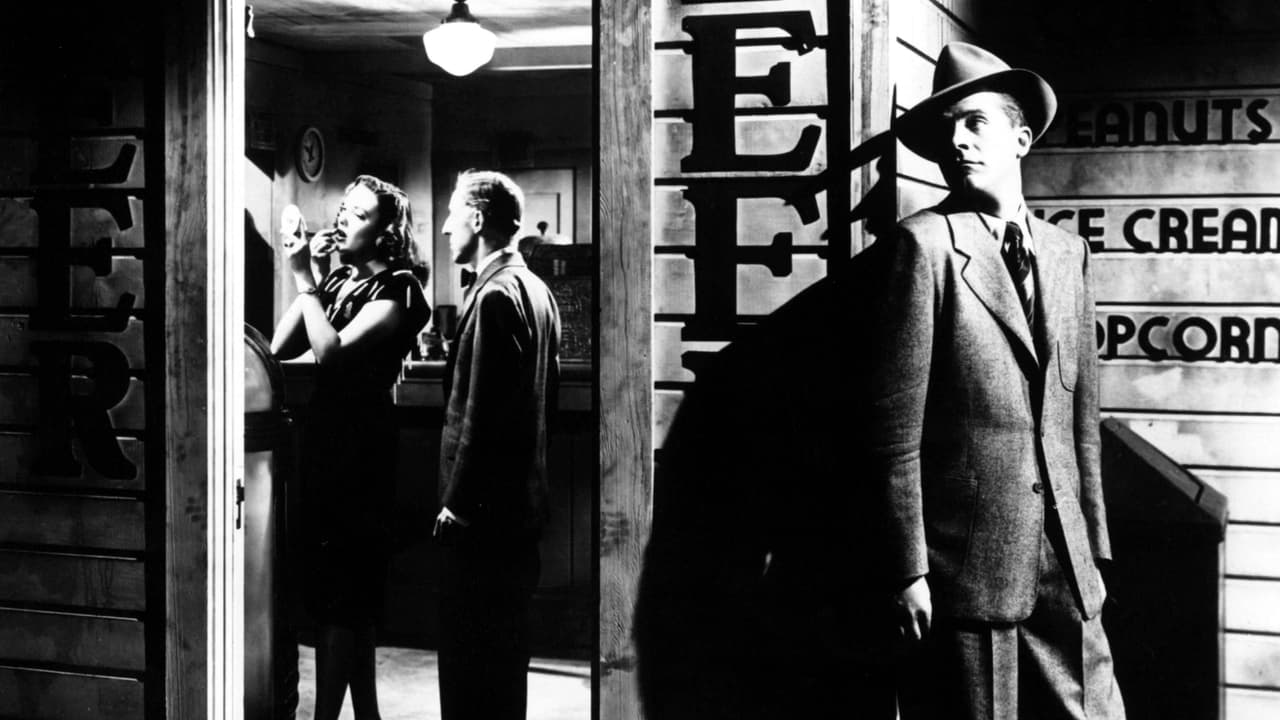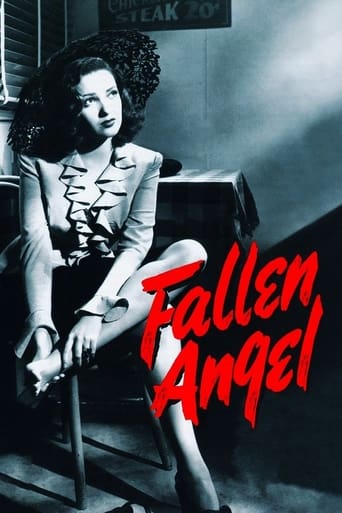



That was an excellent one.
Better Late Then Never
While it doesn't offer any answers, it both thrills and makes you think.
View MoreBy the time the dramatic fireworks start popping off, each one feels earned.
View MoreFALLEN ANGEL is a typically classy slice of film noir from director Otto Preminger, starring that mainstay of the genre, Dana Andrews. He plays a small-time hustler and con man who becomes involved in a love triangle plot between two different women, although the film takes a turn for the darker with a murderous twist halfway through the proceedings. This is a well-shot and well-lit little affair that plays out a tableau of interesting parts, including John Carradine as an evangelist and Bruce Cabot as a love rival. It's literate and well put together; perhaps not one of the most exciting of its type, but the twist ending is one you won't guess.
View MoreDown on his luck drifter Eric Stanton (Dana Andrews) is dropped in a backwater between LA and Frisco after trying to extend his ticket to ride. Having a way with words he is soon involved with the town hottie, waitress Stella (Linda Darnell) as well as a local pillar of the community June Mills (Alice Faye). While Mills is a little naive to the ways of the world and easy to manipulate the more experienced Stella juggles a handful of suitors much to Stanton's frustration. In order to get Stella he's going to need cash and decides to marry June to get it. A murder however short circuits Stanton's plans. Under the meticulous and subtle style of director Otto Preminger Fallen Angel's storyline unfolds with a restrained urgency with its cast of ambiguous characters holding their intent close to their vest. In doing so Preminger stretches the mystery and the number of possible suspects right up until the final moment with clever distractions to keep the audience off balance. Andrews is excellent as the cynical protagonist Stanton, a surly and unpredictable con man whose about to reach a crossroad in his life. Linda Darnell's man eater Stella is one sexy force of nature who can teach Stanton a thing or two about manipulation but she is also capable of attracting sympathy and understanding given the path of lies and broken promises her desirability has attracted from men. Faye's June is a little reticent and gullible at first but gains strength and independence as the film progresses. Charles Bickford, Ann Revere and Percy Kilbride in crucial roles also acquit themselves well.Along with Laura this is Preminger's best early effort as he displays his proficient craftsmanship with the same tension found in the glossier bright lights big city pic. The main set piece may be the counter area in a small town greasy spoon but with Otto as its cook it transforms into three star.
View MoreAdmittedly, I'm not a particular fan of film noir, and even as film noir goes, the first half of this film is a little disappointing. I'm glad I stuck with it, because I felt the second half of the film -- after Linda Darnell's character is murdered -- is better. Or is it just that I'm not a particular fan of Linda Darnell? I always found Dana Andrews to be an interesting actor, and it's unfortunate that his alcoholism led to him fading from the silver screen prematurely. He's very good here, even thought it's difficult to like his character. In fact, maybe that's what's wrong with the first half of the film -- it's not easy to like ANY of the leading characters! Linda Darnell plays her part as a loose woman...seems like she played that part well in more than just this pic. Very difficult to like her in this film.Alice Faye just seemed in the doldrums in the first half of the film, but once she marries Dana Andrews, she turns in a very good performance.Charles Bickford as the retired police detective (and ultimately the murderer) is good, though not outstanding here. The same can be said for the lesser roles by John Carradine and Bruce Cabot.Perhaps the most credit should go to -- surprisingly -- Percy Kilbride. I usually think of him as Pa Kettle, and while I didn't care for that series (after the original "The Egg And I"), he's was quite enjoyable in a number of films. But here, he really shines as a more serious actor, and for a time I was suspecting he was the killer.This film is worth watching, but you do have to stick with it for a while. It won't end up on my DVD shelf, but it was worth watching...once.
View MoreOtto Preminger and star Dana Andrews made this film a year after their highly acclaimed "Laura", with leading ladies Linda Darnell and Alice Faye (top billed above Darnell and Andrews). As with "Laura", this is a mystery film and fits solidly into the genre of mystery, and not suspense as many have claimed. This is just the first of many misunderstandings in my opinion about the film that stem from genre concerns.Although in a sense it's intriguing, the first thing that limits this film is the seemingly random and even arguably contrived nature of the main character's actions. Eric (Andrews) arrives in town short of bus fare to San Francisco, and manages to involve himself with a sham-mystic (John Carradine) and a pair of young ladies with a small inherited fortune (Faye and Anne Revere as her jealous sister), all as a sidelight to falling in love with sultry barmaid Stella (Darnell). He promises Stella that he can get enough money to marry her and buy her a house, seemingly by marrying June (Faye) and stealing her money from the safe deposit box in SF.Given this scenario, it's extremely hard for the film-makers to twist our sympathies so that they eventually favor all 3 of the principals. First of all, we're supposed to believe that June has some deep, truly meaningful emotional commitment to Eric even though they've only known each other for a week and Eric was busted trying to steal her money and could possibly be a killer. It's the old standard "women's picture" trope about the faithful wife, draw to a truly ridiculous extreme that would make most modern viewers cringe.Then we have Eric, a truly weird guy. Dana Andrews was not the best actor to play this character; he is too much of a static presence to play such a dynamic speaker and personality. It calls for the kind of grace and glib that Tyrone Power showed in "Nightmare Alley" or Glenn Ford in "3:10 to Yuma." It's a little bit hard to believe that Dana Andrews of all people has some kind of preternatural charm.But then there's Darnell, cast as a good girl who bears every distinguishing mark and trait of a very bad girl. She's very sexy in this movie and the dance-hall scenes and beach scenes are perhaps some of the steamiest of the 1940s. However I was surprised so many reviewers here singled her out as a bad girl or a "femme fatale." They must be viewing the film through the context of the so-called "film noir" genre as opposed to the mystery genre which this film is actually a part of. If you take time to really re-construct the story, she is a complete innocent (which, in turn, justifies Eric's "obsession" with her as simply a romantic emotion). It's clear she has a prior relationship of some kind with the sadistic detective Judd (Charles Bickford", who we find out at the conclusion was the killer, motivated by jealousy over Eric and another suitor (Bruce Cabot). Instead of a woman motivated to manipulate all 3 men for money, it becomes easy to see that she was so terrified by Judd's behavior that she made a desperate plea to both Eric and Cabot's character in the hopes that they could rescue her from the psycho-stalker police officer. How so many people can still see her as a "femme fatale" after all the facts are on the table is sort of beyond me, but I suppose it's part of the convoluted and unreal nature of this narrative to begin with.The film is far from a total success but just as far from a total bore. The scenes with Darnell and Andrews are delicious, and the weird asexual stalemate between Faye and Andrews is almost as interesting although somewhat too sincere. There's a wince-inducing scene where they lounge on the beach (Andrews: "Every night could be like this: on the beach, eating hot dogs....") and then the strange aftermath of Stella's death with June's disturbing reaction (she insists she knows he can't be the killer, although she's only known him for a week during which he tried to steal her life's savings). Preminger's excellent direction makes this rather predictable and improbable murder a very enjoyable viewing experience.
View More